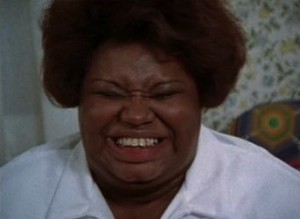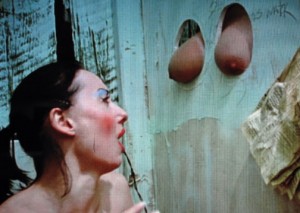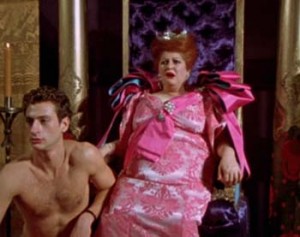Billed as a lesbian melodrama about revolution, “Desperate Living,” the third panel in John Waters unofficial trash trilogy, was again disliked by most mainstream critics. Janet Maslin described the picture in the New York Time as “a pointlessly ugly movie that finds high humor among low life.”

In this tale, again, Waters ridicules bourgeois manners. The credit sequence features a dead rat served on fine china at a fancily-set dinner for one (perhaps homage to Bette Davis’ notorious scene of serving a dead rat to Joan Crawford in Robert Aldrich’s 1962 cult horror film, “What Ever Happened to Baby Jane?”). The credits sequence, which shows the hand of an invisible woman, is the only visually elegant segment in a movie that’s otherwise rude, crude, and gross.
This is the only feature that Waters made without Divine prior to the actor’s death. By now boasting a reputation that went beyond Waters’ films, Divine was touring in a live show and couldn’t fit the movie into his schedule. Another regular, David Lochary, was absent due to his drug-addiction. Waters said, “The reason that David wasn’t in ‘Desperate Living’ is because of PCP. That’s all there’s to it, and he knows it too.” “Desperate Living” is the only lesbian picture in Waters’ repertory, and the most female-dominated: All the leads are played by women. Unlike the other directors in the book, Waters’ protagonists, especially after Divine’s death, are mostly males.
 Mink Stole plays a neurotic housewife named Peggy Gravel, recently released from a mental institute but not ready yet to face the harsh reality of the outside world. (Almodovar has a similar character, albeit a male, in several of his movies, including “Tie Me Up! Tie Me Down!” with Antonio Banderas). In the first scene, the doctor protests Peggy’s too early release from the institution, but her ever-optimistic husband insists that “mental health is just around the corner.”
Mink Stole plays a neurotic housewife named Peggy Gravel, recently released from a mental institute but not ready yet to face the harsh reality of the outside world. (Almodovar has a similar character, albeit a male, in several of his movies, including “Tie Me Up! Tie Me Down!” with Antonio Banderas). In the first scene, the doctor protests Peggy’s too early release from the institution, but her ever-optimistic husband insists that “mental health is just around the corner.”
Early on, Peggy announces: “I have never found the antics of deviates to be one bit amusing.” And, of course, the story that follows goes on to prove the opposite of her statement. When children accidentally knock a baseball at her window, Peggy accuses them of trying to kill her. When the phone rings and it’s the wrong number, she hysterically charges, “How can you ever repay the 30 seconds you have stolen from my life?” Finding her two children—a boy and a girl–naked, playing doctors, she accuses them of perversity. Descending the staircase with a cane, Peggy exclaims: “What have I done to deserve this?” which, of course, is the title of Almodovar’s fourth feature.
 Peggy’s husband Bosley (George Stover), who’s well-dressed (in brown pants, jacket and tie), tries to give her the requisite sedative but she resists. Fighting back, she orders their obese black housekeeper, Grizelda Brown (Jean Hill), to help her kill him, and the latter all too willingly obliges, hitting Bosley with a broom until he collapses dead. It’s a form of revenge for Grizelda, who had earlier been caught by Bosley drinking his liquor and stealing his money.
Peggy’s husband Bosley (George Stover), who’s well-dressed (in brown pants, jacket and tie), tries to give her the requisite sedative but she resists. Fighting back, she orders their obese black housekeeper, Grizelda Brown (Jean Hill), to help her kill him, and the latter all too willingly obliges, hitting Bosley with a broom until he collapses dead. It’s a form of revenge for Grizelda, who had earlier been caught by Bosley drinking his liquor and stealing his money.
Going on the lam, Peggy and Grizelda are arrested by a motorcycled policeman (Turkey Joe) in the woods, just when Peggy protests to Griselda how much she hates “Nature,” because the trees are taking oxygen from her. Weirder than they are, the cop is a cross-dresser—and an exhibitionist at that. He forces himself sexually on the women, demanding that they give him their underwear, which he sniffs with delight. He then orders them into exile to Mortville, a place ruled by the evil Queen Carlotta (Edith Massey). At Mortville, the couple becomes associates of the lesbian wrestler Mole McHenry (Susan Lowe) who desires sex-change operation in order to please her lover Muffy St. Jacques (Liz Renay). One of few Waters films to use the structural device of flashbacks, “Desperate Living” has Mole and Muffy recount how and why they landed in Mortville. Muffy, back then married, was charged with the death of her baby when he was found in the fridge.
 Mortville’s outcasts represent a peculiar mix of notorious criminals, proud sex offenders, hunky black-leathered guys, and nudists. Eccentric to a fault (she’s dressed in hot pink and needs to be carried to her assignments), the tyrannical Queen banishes her daughter Coo-Coo (Mary Vivian Pearce), the heiress apparent, after Coo-Coo shamefully dates a garbage collector (George Figgs), a man beneath her station. He’s later killed by her guards and Coo-Coo goes into hiding with her dead lover. When Peggy betrays Coo-Coo, Grizelda fights the guards and loses her life. Joining the Queen in terrorizing her subjects, Peggy infects them with rabies. The Queen forces her denizens to eat cockroaches and dress and walk backwards. Unable to take the abuse anymore, the populace overthrows Carlotta and executes Peggy by shooting into her anus. To celebrate their freedom, they serve the roasted Carlotta on a platter with an apple in her mouth.
Mortville’s outcasts represent a peculiar mix of notorious criminals, proud sex offenders, hunky black-leathered guys, and nudists. Eccentric to a fault (she’s dressed in hot pink and needs to be carried to her assignments), the tyrannical Queen banishes her daughter Coo-Coo (Mary Vivian Pearce), the heiress apparent, after Coo-Coo shamefully dates a garbage collector (George Figgs), a man beneath her station. He’s later killed by her guards and Coo-Coo goes into hiding with her dead lover. When Peggy betrays Coo-Coo, Grizelda fights the guards and loses her life. Joining the Queen in terrorizing her subjects, Peggy infects them with rabies. The Queen forces her denizens to eat cockroaches and dress and walk backwards. Unable to take the abuse anymore, the populace overthrows Carlotta and executes Peggy by shooting into her anus. To celebrate their freedom, they serve the roasted Carlotta on a platter with an apple in her mouth.
For this film, Waters recruited actors outside of his immediate circle. Liz Renay was a convicted felon and author of the memoir, “My Face for the World to See,” which was referenced in “Female Trouble. “ Casting Renay marked a trend of employing both famous and notorious celebs like Patricia Hearst and Traci Lords. Initially rejected for theatrical distribution in the U.K., the movie was finally released there on video in 1990, after trimming the eyeball-gouging scene. “Desperate Living” became a cause celebre after the Marilyn Manson band paid tribute to the film in their 1994 album, “Portrait of an American Family.” One of the album’s tracks features a recording of Mink Stole shouting at the children: “Go home to your mother! Doesn’t she ever watch you? Tell her this isn’t some Communist daycare center! Tell your mother I hate her!”
 The Byzantine-like plot of “Desperate Living” is laced with touches of cheap porno. The frontal nudity, of men and women, and the sex scenes are particularly shocking. Class barriers are banished when Grizelda and Peggy become lovers, and the scene in which the obese, fully-naked Grizelda makes love to the skinny Peggy is still shocking in its aggression. Similar effects are generated when Queen Carlotta asks one of her guards, clad in black leather, to “f—k” me hard,” and the lad is doing that, like a dog. Waters himself later conceded that the problem with “Desperate Living” was that, “everyone was insane and there was nobody for the audience to identify with.”[ii] Waters knew that his humor was always more poignant when placed in a broader context, when eccentric performers like Divine or Mink Stole are positioned against straighter, or at least “slightly more normal” individuals.
The Byzantine-like plot of “Desperate Living” is laced with touches of cheap porno. The frontal nudity, of men and women, and the sex scenes are particularly shocking. Class barriers are banished when Grizelda and Peggy become lovers, and the scene in which the obese, fully-naked Grizelda makes love to the skinny Peggy is still shocking in its aggression. Similar effects are generated when Queen Carlotta asks one of her guards, clad in black leather, to “f—k” me hard,” and the lad is doing that, like a dog. Waters himself later conceded that the problem with “Desperate Living” was that, “everyone was insane and there was nobody for the audience to identify with.”[ii] Waters knew that his humor was always more poignant when placed in a broader context, when eccentric performers like Divine or Mink Stole are positioned against straighter, or at least “slightly more normal” individuals.
Cast
Mink Stole as Peggy Gravel
Jean Hill as Grizelda Brown
Edith Massey as Queen Carlotta
Mary Vivian Pearce as Princess Coo-Coo
Liz Renay as Muffy St. Jacques
Susan Lowe as Mole McHenry
George Stover as Bosley Gravel
Turkey Joe as Sheriff Shitface
Cookie Mueller as Flipper
Channing Wilroy as Lt. Wilson
Ed Peranio as Lt. Williams
Paul Swift as Mr. Paul
George Figgs as Herbert
Al Strapelli as Dr. Evans
Brook Blake as Bosley Gravel, Jr.
Karen Gerwig as Beth Gravel










